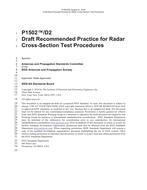More info
Full Description
Scope
This recommended practice establishes processes for the measurement of the electromagnetic scattering from objects. It is written for the personnel responsible for the operation of test ranges and not for the design of such ranges. It recommends procedures for testing and documenting the quality of the measurement system, for calibrating the measurement system, for carrying out the radar scattering measurements, and for delivering the measurement data in a useful format to the end user.The document defines radar cross section (RCS), describes different types of test ranges, and reviews methods of characterizing and operating radar scattering measurement ranges. Issues related to test-object support systems, types of test ranges, instrumentation, signal polarization, calibration, data analysis, and range uncertainty are also discussed. The document defines radar cross section (RCS), describes different types of test ranges, and reviews methods of characterizing and operating radar scattering measurement ranges. Issues related to test object support systems, types of test ranges, instrumentation, signal polarization, calibration, data analysis, and range uncertainty are also discussed.
Purpose
Although many RCS measurement ranges are built for specific localized purposes (for example, airplane measurements) and methods of characterizing the ranges and performing the measurements are developed for the specific needs of each particular test range, many other objects are measured nowadays, and the corresponding ranges are probably not dedicated to a specific class of objects. Consequently, this recommended practice is intended to establish guidelines so that operators and users of RCS ranges can provide results that are useful across a larger community of users
Abstract
Revision Standard - Active.The process of the measurement of the radar cross section of objects using a test range is described in this recommended practice. The term radar cross section (RCS) is defined, and the characteristics of different types of test ranges are given. The responsibilities of the test range operators are shown to involve test and calibration of the measurement range systems and to take the measurements accurately. Techniques are described for each stage of this process.
 View larger
View larger  View larger
View larger 
